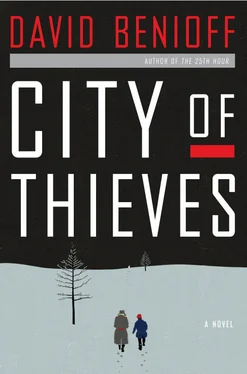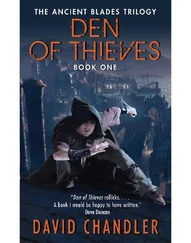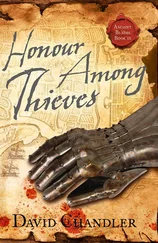I had the uncomfortable feeling that Kolya was making himself aroused all over again as he told the story.
“So you missed your ride back.”
“Oh, I missed it by hours. But I wasn’t worried, I’d find another car heading back to the battalion. I knew most of those boys delivering messages, it wouldn’t be a tough trick. You should have seen me walking out of Roza’s building. Different human being from the one who walked in. Relaxed, big smile on my face, bit of bounce in my stride. I step out the front door, I’m practically skipping down the sidewalk, and an NKVD patrol, four of the dirty bitches, stops me. Man asks to see my LOA papers. I don’t have any LOA papers, I tell him. I’m delivering messages for General Stelmakh—the man’s planning a battle, he needs rifles, he needs mortars, he doesn’t have time to sign some shit-stained LOA. Stelmakh’s one of your tribe, I think. Did you know that?”
“Does this story ever end? Are you going to keep talking for the rest of my life?”
“This little glorified policeman interrogating me, he’s still got a Hitler mustache. You’d think everyone in Russia with a Hitler mustache would have shaved it by now, but no, this dank cunt thinks it’s a good look for him. He asks me why I’m delivering messages from General Stelmakh to an apartment building in the Vyborg section. I decide a little bit of truth never hurt, decide to appeal to the man’s humanity. I give him a wink, tell him I got myself a bit of ass while I waited for my ride back to the general’s HQ. You’d think he’d grin and slap my back and tell me to get my LOA in order next time I left my battalion. Four months I’d been on the front line while this mustachioed dwarf minced around Piter, arresting soldiers for bringing a bit of meat home to their parents, a bag of rice. This was my mistake. I appealed to a bureaucrat’s humanity. He has his men slap the manacles around my wrists and then he gives me this little superior smile and tells me General Stelmakh is in Tikhvin, two hundred kilometers away, he’s just won an important battle.”
“You shouldn’t have said Stelmakh. That was stupid of you.”
“Of course it was stupid! My cock was still wet!” Several of the partisans muttered at Kolya to shut up and he lowered his voice. “My brain wasn’t working right. I couldn’t believe this man was accusing me. Do you understand how fast it changes? I was a soldier in good standing in the afternoon, and there I am, five hours later, accused of desertion. I thought they’d shoot me right there in the street. But they took me to the Crosses instead. And then I met you, my moody little Hebrew.”
“How did Yulia die?”
“What? I don’t know. I suppose she starved.”
We lay quietly for several minutes, listening to the men around us sleep, some of them quiet, some rasping and nasal, some shooshing like wind in a chimney. I tried to distinguish Vika’s breathing from the others’, curious what sounds she made in the night, but it was impossible to tell.
I had been annoyed with Kolya for keeping me awake with his endless talk, but in the silence I was suddenly lonely.
“Are you asleep?” I asked.
“Hm?” he murmured, groggy, the fast sleeper—his story told— already sailing away into his dreams.
“Why is it dark at night?”
“What?”
“If there are billions of stars, and most of them are just as bright as the sun, and light travels forever, how comes it’s not bright all the time?”
I wasn’t really expecting an answer. I figured he would snort and tell me to go to sleep, or give some pat reply like, “It’s dark at night because the sun is down.” Instead he sat up and stared down at me. I could see the frown on his face by the fluttering light of the bourgeois stove.
“That’s an excellent question,” he said. He thought about it some more, peering into the darkness outside of the stove’s circle of light. Finally, he shook his head, yawned, and lowered himself to the ground again. Ten seconds later he was asleep, snoring, the whoosh of his inhalations followed by the chuffing of his exhales.
I was still awake when the guard outside came in from his shift, woke up his replacement, refilled the stove with some twigs he’d gathered, and lay down in the circle of huddled bodies. For another hour I listened to the wood knots popping, thinking about starlight and Vika, until I finally fell asleep and dreamed of a sky raining fat girls.
The partisan on guard duty woke us before noon, crashing in through the cabin door, trying to keep his voice down despite his panic.
“They’re coming,” he said. We were on our feet before he could get his second sentence out, gathering our gear, instantly alert with the news of real danger. We had slept in our boots and were ready to move. “Looks like a whole company. With prisoners.”
Korsakov slipped his rifle strap over his shoulder. “Infantry?”
“Didn’t see any armor.”
Thirty seconds later we streamed out the crooked door into the hostile sunshine. The windowless cabin had been dark as a crypt and I could barely open my eyes in the noontime glare. We followed Korsakov and the unspoken order was simple: run.
We never had a chance. Even before the last man was out of the cabin I could hear German voices shouting. I became like an animal, with no thoughts in my head, nothing but fear to drive me. The air had grown warmer and the snow was heavy and wet, grabbing at my boots, sucking me down.
When I was nine, a delegation of famous French Communists visited Piter and the Party spruced up the streets. Workmen with cigarettes dangling from their lips poured fresh tar onto Voinova Street and leveled it with long-handled trowels, making my street look like a boulevard of melted chocolate. I had been watching all morning with the Antokolsky twins, just in front of the Kirov gates. I don’t remember anything triggering our collective decision. Without saying a word, without even a glance at one another, we pulled off our shoes, tossed them into the courtyard, and sprinted across the street. We could have burned the soles off our feet, but we didn’t care; we left our footprints in the soft road and kept running when we reached the far side, while the workmen cursed and shook their trowels at us, not caring enough to chase us, knowing we could never be caught.
My mother needed an hour that night to scrub my feet clean, angrily scouring them with soap and pumice. My father stood by the window, his hands behind his back, suppressing a smile as he looked down at Voinova. Beneath the streetlights the road was glossy and perfect, save for three pairs of little footprints marring the surface like seagull tracks on the wet sand.
Running across drying tar was not like running through the melting snow; I don’t know why the memories linger side by side, but they do.
Gunshots echoed among the firs. One whistled past, so loud and close I touched the side of my head to see if I’d been hit. I saw the man in front of me tumble to the ground and I could tell from the way he fell that he would never stand again. I could not move any faster and I could not be more afraid; watching the man go down changed nothing in me. At that moment I was no longer Lev Abramovich Beniov. I did not have a living mother in Vyazma or a dead father in some unmarked patch of dirt. I was not descended from black-hatted Torah scholars on my father’s side or petit bourgeois Muscovites on my mother’s. If a German had caught me by the collar at that moment, shaken me, and demanded my name in perfect Russian, I could not have answered him, could not have framed a single sentence to plead for mercy.
I saw Korsakov turn to fire at our pursuers. Before he could let off a shot, a bullet cleaved his lower jaw from his skull. He blinked, his eyes still alert though half his face was gone. I ran past him, up a steep ravine and down the other side, where a stream had formed in a narrow gully, the meltwater gurgling as it snaked past tumbled rocks and fallen branches.
Читать дальше












